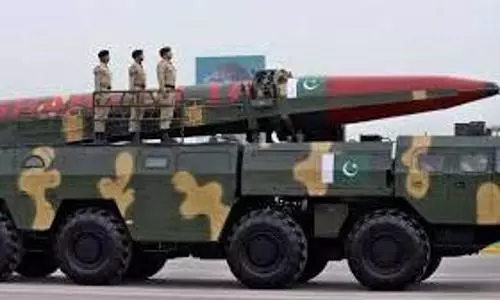
The starvation deaths in Yemen
text_fieldsPerhaps it is too early to say that the waves of Arab spring that blew in West Asia and North Africa in 2011 has died down. Although the dictators who had ruled there for decades were deposed, the revolts were not able to fully open the windows of democracy anywhere except in Tunisia. Not only that, in Syria even after seven years of resistance Bashar Al-Assad's carnage is continuing unabated.
The situation in Yemen is no different. Although Ali Abdulla Saleh was removed from power, new nation-building was blocked half-way through by many factors. In other words, a general assessment about the popular agitations that rose against dictatorships is that in their second phase, they slowly gave way to internal strife and foreign armed interventions. The countries that had to pay the biggest price for this are Syria and Yemen. If it was the use of chemical weapons by Bashar Al-Assad's military that hit the headlines in Syria, what we hear from Yemen are stories of starvation deaths.
Reports from Yemen tell us once again that the first victims of any war front are women and children. According to a UN report, by now 85,000 children died of starvation which shows the depth of the crisis and uncertainty faced by that country. Statistics do not end there. A fifth of households of the country are said to have been living in dire poverty for a few months now; this means that half of the population, nearly 1.1 crore people are on the brink of starvation. Though the remaining are not in utter starvation, different reports testify that 70 per cent of the people do not get three square meals per day. Many including World Health Organization have already warned that if this sad state of affairs continues, 30 per cent of Yemen's children will have to succumb to starvation deaths. Clearly, the current crisis is capable of wiping out a whole nation. It was in this context that Unicef described Yemen as 'the hell on earth'. And it was for the same reason that UN put the Arab nation of Yemen at the top of the countries that need most relief aid next year. The UN estimated that a minimum of 2.19 billion dollar worth of aid is urgently needed for Yemen. But the situation is so complex that even after delivery of this volume of aid, problems will cease only temporarily. Parallel to this, acute financial crisis is also plaguing Yemen.
These reports about starvation deaths in Yemen reached the outside world at the same time when news came of 'designer baby' being created in China through gene editing. At a time when science and technology have grown to such a level as to give birth to babies free from disease and in the model desired by parents (though that technology has not been approved by the scientific world for moral reasons), these starvation deaths should put any nation with conscience to shame. By using the techniques developed by mankind through science and technology, today we are producing food grains in excess of what we actually need, and that is being delivered to those in need with reasonable amount of transparency too. That is how we have been able to alleviate starvation of poor countries to some extent. But this is not possible inYemen (and Syria) solely because the circumstances there are are so bad and inconducive for any volunteers to enter there.
For this reason the only wayout from these starvation deaths is to end the war itself. Although peace efforts have taken place earlier, none of them met with success for various reasons. Now, a ray of hope is beaming from Sweden. Rebels including Houthis have become willing for peace talks with UN representatives. Several political observers have termed the talks in Sweden as the 'last chance', because they are so critical. It is customary to say that war begins where diplomacy fails and Yemen is really in the grip of such a sad fate. One can expect that a wayout from that can be made possible through the talks in Sweden. Even then problems cannot be said to have come to an end. The lasting solution will still be to take a detour to the path of democracy through negotiations and consensus.























